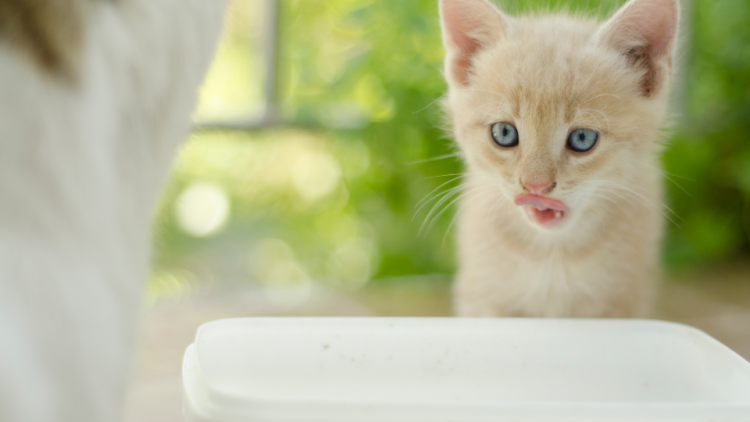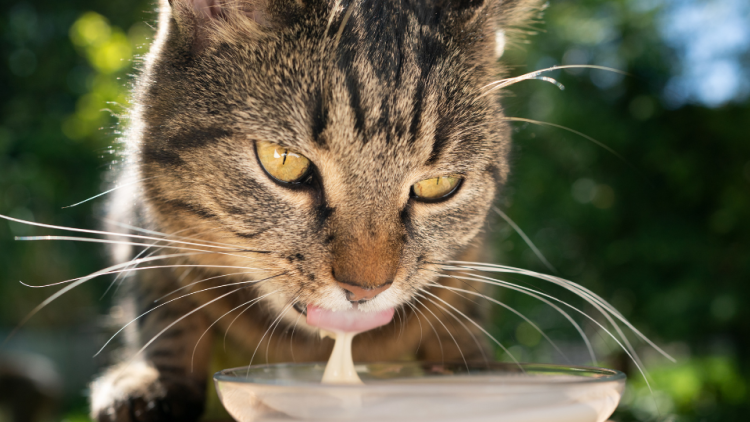We all know that kittens drink milk, but can cats drink milk once they're weaned? We’ve been seeing felines indulging in milk on TV for years, so it comes as no surprise that many cat parents believe that their pets need milk in order to be healthy. The truth is, regardless of how tasty milk might be to your feline friend, it can do more harm than good.
In this article, we’re discussing why cats shouldn’t drink milk, whether they can safely consume other dairy products and more.
Table of Contents:
- Is milk healthy for cats?
- Can kittens drink milk?
- What kind of milk can cats drink?
- Can cats drink goat milk?
- Can cats drink almond milk?
- Can cats drink soy milk?
- What can cats drink instead of milk?
- Can cats eat other dairy products?
- Key Takeaways
Pro Tip: If your feline companion snacks on something they shouldn’t, pet insurance is one way you can make sure they get the professional help they need along with a financial helping hand for vet bills.
Is milk healthy for cats?
When we’re talking about feeding milk to cats, most of us refer to cow’s milk. Cow’s milk isn’t healthy for cats as it doesn’t provide all the nutrients your feline friend requires, especially if it's consumed in place of a balanced meal.
Most cats are lactose intolerant as they don’t have the enzyme lactase needed to digest the sugar in milk called lactose. This means that drinking milk can cause similar symptoms as in lactose-intolerant humans: diarrhea, vomiting, and abdominal pain.
Milk also contains high amounts of fat and if consumed in large amounts, it can lead to weight gain and upset your cat’s stomach.
Can kittens drink milk?
Just like adult cats, kittens should not consume cow’s milk. Kittens drink their mother’s milk until the mother weans them gradually, sometimes as early as four weeks old. By about eight to ten weeks of age, kittens are eating solid foods and lose the ability to digest the sugar found in milk.
The only time you might need to feed milk to kittens is if you have to bottle-feed them. Even then, you should steer clear from cow’s milk and only give specific kitten milk which has the right balance of nutrients.

What types of milk can cats drink?
If you want to treat your feline friend to some milk, the best option is to buy special cat milk from the pet store or the supermarket. These products usually contain a lot less lactose or are completely lactose-free, so they reduce the likelihood of cats getting sick from drinking milk. However, the fat content is still high, so you should only offer special cat milk as an occasional treat and in small quantity.
Can cats drink goat milk?
Goat milk might be a better option than cow’s milk as it contains less lactose and is easier to digest, even for lactose-intolerant cats. It should be noted though that while goat’s milk has less lactose than cow’s milk, there’s still enough to affect your cat negatively.
Goat’s milk is also lower in fat than cow’s milk but again, it still contains fat and should be given in limited amounts. You can buy skimmed and partially skimmed goat’s milk to reduce the fat content.
Can cats drink almond milk?
Almond milk is safe for cats if fed in small amounts because almonds are non-toxic to felines. As with the other types of milk, the main concern with cats drinking almond milk is the high-calorie content. An average 10-pound feline needs about 200 calories per day and a single cup of almond milk has about 100 calories!
In addition, some types of almond milk are sweetened, i.e. they contain added sugars that can lead to obesity and tooth decay. Artificial sweeteners like xylitol should also be avoided because the compound is highly toxic to cats.
Can cats drink soy milk?
Soy is also safe for cats and is actually found in many commercial cat foods as a source of protein. However, soy is one of the top food allergens in many pets which is why soy milk shouldn’t be given to cats with food allergies.
The Bottom Line:
Milk isn’t toxic to cats, but if you decide to offer it, do so in moderation. A couple of sips at the bottom of the bowl should be enough. If your cat drinks milk and shows symptoms of a stomach upset, it’s probably a sign that they are intolerant and should not be fed milk again. If these symptoms persist, take your cat to the vet.

What can cats drink instead of milk?
Cats need plenty of water, which is very important for promoting optimal organ function. Water helps your feline friend regulate body temperature, eliminate waste, digest food, lubricate tissues, and prevent dehydration.
To encourage your kitty to drink water, try placing several bowls around the house or consider purchasing a kitty fountain as many cats like flowing water. Another great way to ensure that your pet is drinking enough water is by feeding them wet canned food. Cats are generally not very keen on drinking water, so wet food is excellent for keeping them hydrated.
Besides water, cats can also safely consume bone broth and tuna juice. Bone broth has many health benefits for cats including improved digestion and liver health. When it comes to tuna juice, be sure to opt for tuna in water since too much oil can cause stomach upset, and watch out for the salt content.
On the other hand, there are certain drinks that cats should never consume, such as alcohol, caffeinated drinks, and sugary drinks.
While it may seem quite unlikely that a cat would try to drink alcohol, they might be tempted to try a beverage that includes cream or milk. A few sips shouldn’t cause any harm, but if your cat drinks a significant quantity of alcohol, they might suffer alcohol poisoning.
When it comes to caffeine, cats are more sensitive to it than humans. According to VCA Animal Hospitals, “While taking a sip of hot coffee or iced tea probably will not adversely affect most pets, ingestion of one or two caffeine pills can be fatal for small dogs and cats.”
Sugary drinks like fruit juices, especially store-bought ones, can quickly lead to obesity or even contribute to diabetes.
Pro Tip: When it comes to feline diabetes, early detection and proper vet care are crucial. The right pet insurance plan will allow you to give your kitty the best possible care. Knowing that you don’t have to worry about unexpected vet bills can take a load off of your mind and enable you to focus on your pet’s well-being.
Can cats have dairy products?
Sometimes, cats that can’t tolerate milk might have no issues with other dairy products, so some cats can eat cheese, yogurt, ice cream, and butter. This is because different forms of dairy contain different amounts of lactose. Products like ice cream and yogurt are often diluted with other things like water. Foods like yogurt and cheese might also be cultured, which means that microorganisms have digested a portion of the lactose.
Key Takeaways
- Most cats are lactose intolerant, which means that milk can cause digestive issues like diarrhea and vomiting. Milk also contains fats that can cause obesity and tooth decay.
- Special cat milk, goat milk, and almond milk may be safer options due to their lower lactose levels, but they still contain fats and should only be given in small amounts.
- Water is the best choice of drink for your feline companion.
- If you have any concerns or questions related to milk and other dairy products, your vet is the best source of information.
